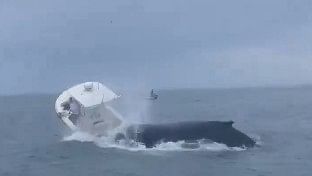
Screengrab of the whale jumping out of the ocean in Rye, New Hampshire and crashing into a boat.
Credit: X/@AMAZlNGNATURE
Ryland Kenney didn't get much sleep Tuesday night because he kept picturing the mouth of a humpback whale.
Kenney, a fisherman, and his friend, Greg Paquette, were about 2 miles off the coast of Rye, New Hampshire, that morning when a 30-foot-long juvenile whale lobbed itself onto the back of their 23-foot motorboat, sending the bow of the boat skyward and Kenney and Paquette into the water.
All three parties, including the whale, were uninjured, the United States Coast Guard said, but Kenney couldn't stop playing the episode in his head, seeing the whale "resting its head on the engine."
Kenney, 44, and Paquette, 54, are experienced fishermen, Kenney said, and the two had been out the previous few days because the fishing had been the best they'd seen in a decade. They'd also seen what they believed to be the same whale, which was feeding on bait fish in the area.
On Tuesday morning, they waited for a heavy fog to clear and left Eliot, Maine, on the New Hampshire border, just after 5 am in search of the schools of bait. They encountered the whale once again.
"I've tried to be as safe as possible and fish outside the bait school," he said. "You don't want to be in the center of the biomass for the bait because that's likely where the whale will come up. We were on the edges -- a lot of boats weren't."
The whale breached several times throughout of the morning. As it moved closer in search of bait fish, the fishermen moved the boat further away.
But just as Kenney started to reel in a striped bass around 7:30 a.m., he saw the whale pop out of the water about 100 feet behind them. He kept his eyes peeled for further movement but didn't see anything. Then there was a sound.
"All of a sudden in the back of the boat I hear a rumbling of the ocean right behind the boat," he said.
Within moments, the whale's head popped up, its mouth open, likely trying to scoop up the bait fish it was feeding on.
"As it collapsed onto the boat, the mouth closed and smashed the top of the motor and I heard a big crunch," said Kenney, who still had a rod in his hand. "I had three seconds to act. I wasn't scared; I didn't have time to be scared."
As the whale weighed down the stern, the bow started to rise, and Kenney had to quickly decide how to get off the boat -- if he moved too far toward the front, he risked having the entire boat capsize on him. So he edged himself to the middle until he felt the boat start to fully tip, threw his rod overboard and jumped into the water, all within a matter of seconds.
The cold North Atlantic water shocked Kenney and his breathing became labored as he realized Paquette was nowhere to be seen. Eventually Paquette popped up from under the boat in a life vest and started to swim toward Kenney. The two embraced.
"That's when I started to feel calm -- I'm with my friend, let's get to safety," he said.
The dramatic flip was caught on video by Colin Yager, 16, who was out fishing on another boat nearby with his brother, Wyatt. Kenney and Paquette were in the water for only a few minutes when the Yager brothers sped over to rescue them. The Yagers transferred them to the boat of a friend, who took them back to shore.
If no one had been around, Kenney said, he wasn't sure they would have survived.
"The night before it happened, my family asked if I was worried about a whale landing on the boat and I said, 'The chances of it happening are like getting struck by lightning,'" Kenney said. "Of course, the next day lightning strikes and a whale lands on us."
Dianna Schulte, a co-founder and director of research at the Blue Ocean Society for Marine Conservation in Portsmouth, New Hampshire, confirmed the whale was a humpback likely feeding on bait fish.
"It's feeding season for many large whales, like humpbacks, who don't eat during their winter breeding season in the Caribbean. This whale wasn't 'angry' -- it was hungry," she wrote in a statement posted to social media. "Boaters happened to be in the area at the same time."
"If you see a whale, don't approach it, or leave your fishing line in the water," she added. "Lines can entangle whales, and whales can damage your boat."
In an email, Schulte said her group had not been able to match the whale in the video to an animal seen in those waters before.
Humpback whales, often found close to shore and known for balletic breaches, are a favorite of whale watchers. They inhabit all major oceans, and during the warmer months, they spend most of their time feeding and building up fat for winter.
Kenney said he learned a few bait-fishing lessons Tuesday: If you think you're at a safe distance, add another 50 feet; do not leave your home port without a life vest on; and make sure other boats are nearby. The boat they were using, which belonged to Paquette's brother-in-law, was mostly unscathed but would need a new engine, he said.
For now, Kenney plans to take some time away from the water and work on his own boat. As luck would have it, he ordered a new tool in the days before Tuesday's episode: a sophisticated radar system -- one that can alert the proximity of whales.